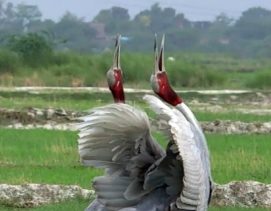Pilibhit: The Uttar Pradesh forest department will begin a two-day census of sarus cranes in the state, starting from Monday.
The state forest authorities have issued directions to field directors of all tiger reserves, divisional forest officers of reserve forest divisions, wildlife sanctuaries, and social forestry divisions to cover major areas of agricultural belts and water bodies which are deemed as preferred sites for the bird’s roosting and nesting.
As part of the drive, field forest teams in coordination with local volunteers, NGOs, and avian experts will carry out the counting of the species in two slots.
However, eminent avian researchers and experts have emphasised the need for intensive counting of sarus cranes instead of an extensive approach.
Sudhir Kumar Sharma, principal chief conservator of forest (wildlife), said: “The entire state has already been divided into range areas and beats of protected forest as well as social forestry divisions in non-forest areas. The counting will be conducted by concerned range officers and trained field staff deployed in different beats. The ocular details of sarus cranes and their nests will be noted on prescribed pro forma and district figures will be compiled at state headquarters.”
Dr Asad R Rahmani, former director of Bombay Natural History Society (BNHS), said: “As precise counting in the vast agricultural area and all wetlands in the state is simply not possible in just 4 shifts of 2 hours each divided in two days, it would be better if the wildlife authorities initiate a drive to identify some selective hotspots of sarus cranes and carry out the counting process there only”.
“This kind of counting will give an exact idea of the increasing, stagnant, or dwindling trends in sarus population. In fact, finding out the trend is the most important feature needed for chalking out conservation plans rather than a flawed method of collecting figures.”
Dr Amita Kannaujia, a zoology professor at Lucknow University, said: “Rapidly disappearing wetlands due to illegal possessions and infrastructural development, and increasing use of pesticides and chemical sprays in agriculture, are posing great threats to the survival of sarus cranes. The network of high-tension electricity lines is also liable for fatal accidents of the bird.”
Notably, sarus crane had earlier been enlisted in schedule IV of the wildlife protection act but it was upgraded to schedule I in the amended act of the year 2022 enforced from April this year.
This bird has been classified as vulnerable on the International Union for Conservation of Nature Red List.
The counting of sarus cranes is conducted twice every year in June and December which are the pre-breeding and the post breeding seasons respectively.
As per official estimation of the year 2022, Uttar Pradesh had 19,180 sarus cranes of which districts Etawah and Auraiyya marked the highest density of the bird, followed by the Terai region of the state.
_IANS


Comments are closed.